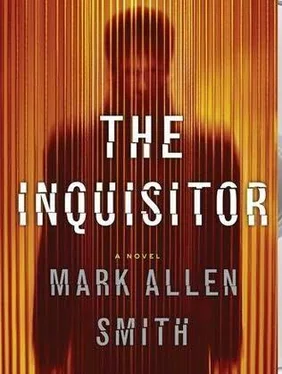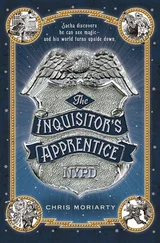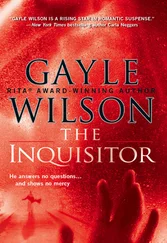Mark Smith - The Inquisitor
Здесь есть возможность читать онлайн «Mark Smith - The Inquisitor» весь текст электронной книги совершенно бесплатно (целиком полную версию без сокращений). В некоторых случаях можно слушать аудио, скачать через торрент в формате fb2 и присутствует краткое содержание. Жанр: Триллер, на английском языке. Описание произведения, (предисловие) а так же отзывы посетителей доступны на портале библиотеки ЛибКат.
- Название:The Inquisitor
- Автор:
- Жанр:
- Год:неизвестен
- ISBN:нет данных
- Рейтинг книги:5 / 5. Голосов: 1
-
Избранное:Добавить в избранное
- Отзывы:
-
Ваша оценка:
- 100
- 1
- 2
- 3
- 4
- 5
The Inquisitor: краткое содержание, описание и аннотация
Предлагаем к чтению аннотацию, описание, краткое содержание или предисловие (зависит от того, что написал сам автор книги «The Inquisitor»). Если вы не нашли необходимую информацию о книге — напишите в комментариях, мы постараемся отыскать её.
The Inquisitor — читать онлайн бесплатно полную книгу (весь текст) целиком
Ниже представлен текст книги, разбитый по страницам. Система сохранения места последней прочитанной страницы, позволяет с удобством читать онлайн бесплатно книгу «The Inquisitor», без необходимости каждый раз заново искать на чём Вы остановились. Поставьте закладку, и сможете в любой момент перейти на страницу, на которой закончили чтение.
Интервал:
Закладка:
Looking down to West Eighty-eighth Street, Corley saw Geiger come around the corner and approach the side door to his building. Geiger had called for an appointment eight months ago, after finding Corley’s name listed on a psychiatric website. At their first session, he revealed the reason for his presence: two months earlier he’d had a dream of epic intricacy and drama, followed by a massive migraine. Since then, Corley had learned, the dream had been playing every two or three weeks in slightly different versions on his mind’s stage, and in each case an excruciating migraine had provided the second act. In all their sessions, Geiger had been precise and devoid of guile, a provider of emotionless reportage. Corley found his new patient to be an intriguing contradiction, the equivalent of an intelligent stone.
At the end of the first session, when Geiger had decided to continue the process, he’d voiced two requirements. First, he would talk only about the dream. He would not speak about his past, or his life outside the walls of Corley’s office. Second, he must be given a key to the building’s service entrance so that he wouldn’t have to walk through the lobby.
Corley had sat back in his chair, scratching his white-streaked beard, and asked why.
“Because I know what works best for me,” Geiger had answered.
It was the first of countless times that Corley had been struck by a tone Geiger often summoned. Though equable and uninflected, it was anchored in a certainty that made further discussion seem unnecessary, even pointless. Geiger’s first rule, limiting all discussion to the events of a dream world, meant severely constricting the usual therapeutic borders, and his request for a key was far beyond the accepted rules-no patient had ever asked for one. But Corley had agreed to both. Geiger’s dream, proof of some radical turmoil the man was clearly incognizant of, had been gasoline poured on the pale embers of Corley’s passion. He had wanted Geiger to come back.
From his terrace, Corley watched Geiger unlock the service entrance and go inside. After dropping his cigarette in a flowerless clay pot, Corley walked back into his office.
Corley stared at the notepad on his lap. He’d started taking notes during sessions only recently. In the past, he’d jot down a few notes in between patients and flesh them out at night. Then he began to notice a slight, nocturnal stutter in his memory, a minor lag in recalling details. He’d given ginkgo biloba a try, but stopped because he kept forgetting to take it.
“So,” he said, “the web was finished, a moth was snared, and you put a flame to everything. What do you think that was about?”
Geiger lay on the couch staring at the bookshelves on the wall. He knew the literary skyline by heart-every title, author, color, and font. In the center of the lower shelf was a framed photograph of a large, rambling house set on a rolling lawn amid majestic trees. Its strong lines and angled roof appealed to him. He’d asked Corley about the house in the past and received curt responses. All Geiger knew was that it was a hundred years old and located in Cold Spring, New York, about an hour away.
“What do I think that was about?” said Geiger. “I’m not sure. What do you think it was about?”
“Well,” said Corley, “it could’ve been about control. Power.”
Geiger’s fingertips tapped the couch in shifting combinations of sequence, speed, and rhythm. For Corley, the sound had become part of the sessions, a soft percussive accompaniment to spoken words. For the first four months of therapy, Geiger had called for an appointment only after a dream-migraine event, and that was the only subject discussed. But gradually the irregular sessions evolved into a weekly visit, sometimes twice a week, and lately Geiger seemed less strict about his first rule. Sometimes, as he’d done today, he would even chronicle a real-life event.
“Maybe it was about completion,” Geiger said.
“Interesting.”
“Is it?”
“I think so,” Corley replied. “You might have said ‘destruction,’ which could be considered the opposite of completion.”
“Good point, Martin.”
Before Geiger, no patient had ever addressed Corley by his first name, in thirty years of sessions. The first time, it had sent ripples skipping across the calm surface between them, leaving the psychiatrist unsettled and shifting in his chair. It had stirred something in him, the unforced familiarity in the gesture so contradictory to Geiger’s basic inscrutability. Corley had never said anything about it, and ultimately he’d embraced it as part of their unusual dynamic.
“Everything’s a process,” Geiger said. “Beginning, middle, end. That’s what works best for me. You know that. Completion.”
Geiger’s gaze drifted to the ceiling. Years ago there had been water damage. His eye was always drawn to the subtle change in texture caused by the repair. He knew, step by step, exactly how they’d gone about the work, because he’d done the same kind of job hundreds of times himself.
“Why do you think we’re talking about the spider?” said Corley.
Geiger bent his right knee and pulled the leg slowly up to his chest. Corley waited for the familiar, soft pop in the sacral joint.
“The spider had finished its web,” Geiger said. “So why did I torch it? I’m not sure. Because it’s in my territory?”
“And only you decide when something’s finished in your domain?”
“King of all I see?” A soft sound slipped out of him. It could have been a sigh. “That’s a line from something, isn’t it?”
“ Richard the Third?” said Corley. “ Yertle the Turtle?”
“What?”
“The children’s book.”
Corley waited, scraping fingertips down one bearded cheek and then the other. But Geiger’s silence was like the sound of a door slamming shut.
“Do you remember any children’s books?” Corley asked. “Or songs? Does anything come to mind? Maybe toys, or-”
“No. Nothing comes to mind.”
Over time, Corley had come to think of Geiger as a lost and beleaguered boy who had somehow remained undaunted. Because Geiger’s dreams were virtually the sole context in which Corley could work, he knew almost nothing about the man and could only guess at what lay beyond the borders of their sessions. Even so, Geiger’s story about the spider and conversations like this one convinced him that the child in Geiger was buried beneath so much traumatic rubble that it was more ghost than real. Sometimes Corley felt like a medium at a seance trying to contact the dead.
Corley glanced at his watch. It was the last gift his wife had given him. Engraved on the back was Where does the time go? Love, Sara.
“We’re almost out of time,” he said, “so let me put something out there for you to think about-about the spider.” He straightened the pad on his knee and wrote, Empathic? “Maybe setting fire to the web wasn’t about completion or dominion.” He noticed the dance of Geiger’s fingers becoming more intense. “Maybe you didn’t want the spider to kill the moth.”
Geiger’s fingers came to rest, and he sat up. Corley watched the overdeveloped trapezius muscles shift beneath his shirt. Geiger’s shirts were always long-sleeved, brushed black cotton, and closed at the neck.
Geiger stood up and swiveled his head left and right. Corley heard dual click s.
“Food for thought,” Geiger said. Then: “Tell me something, Martin.”
Corley had expected the request. It had become part of the process, part of Geiger’s exit ritual. It was usually Tell me something… and a question would follow, or By the way… and a seemingly insignificant bit of news would be proffered. Corley knew that these last exchanges helped Geiger manufacture a closing to a process that was, by its nature, open-ended, and so gave him, depending on the tenor of the session, a parting sense of control.
Читать дальшеИнтервал:
Закладка:
Похожие книги на «The Inquisitor»
Представляем Вашему вниманию похожие книги на «The Inquisitor» списком для выбора. Мы отобрали схожую по названию и смыслу литературу в надежде предоставить читателям больше вариантов отыскать новые, интересные, ещё непрочитанные произведения.
Обсуждение, отзывы о книге «The Inquisitor» и просто собственные мнения читателей. Оставьте ваши комментарии, напишите, что Вы думаете о произведении, его смысле или главных героях. Укажите что конкретно понравилось, а что нет, и почему Вы так считаете.












